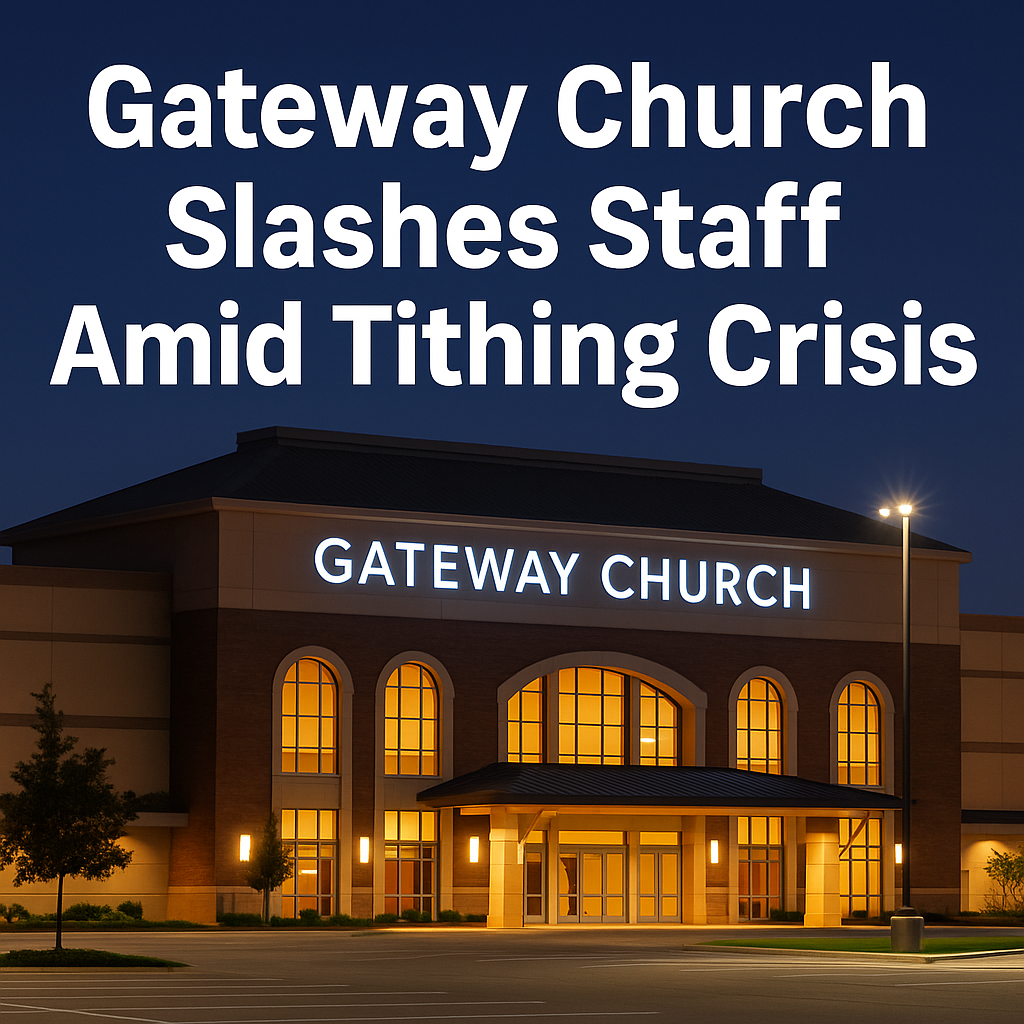Gateway Church Announces Staff Cuts Following Steep Decline in Tithes and Offerings
Gateway Church, one of the largest megachurches in the United States, has announced a significant round of staff reductions, citing an unexpected and substantial drop in tithes and offerings. The announcement, made public in June, has sent shockwaves through evangelical circles and raised urgent questions about the financial sustainability of large churches in the post-pandemic era.
Located in Southlake, Texas, Gateway Church is widely known for its charismatic leadership under Founding Pastor Robert Morris and its multi-campus outreach, which includes ministries across North Texas and an expansive online presence. With over 100,000 attendees and online viewers participating weekly, Gateway has been a symbol of American evangelical growth for the last two decades.
But church leadership revealed that contributions have plummeted by 20%, prompting what it called a “right-sizing” of operations. In a statement to members, Executive Senior Pastor Tom Lane stated, “This is a course correction to ensure we are being good stewards of God’s resources.” According to Lane, the staff cuts are part of a broader strategy to stabilize Gateway’s finances while refocusing on core ministries.
The news was confirmed in multiple reports, including the Christian Post and ChurchLeaders.com, where Lane emphasized that while the decision was “deeply painful,” it was necessary to preserve the church’s long-term mission. “We’re not reacting out of panic. We’re taking responsible, prayerful steps,” Lane said.
Although Gateway has not disclosed the precise number of layoffs, sources familiar with the situation suggest the church has let go of dozens of full-time and part-time staff members across various departments. The cuts reportedly affect administrative, media, and outreach roles, as well as some pastoral positions.
The church’s explanation points to several contributing factors. Post-COVID attendance normalization, economic inflation, and shifts in congregational giving habits are all cited. But beyond these surface-level issues lies a deeper concern for many conservative Christians: a gradual cultural departure from traditional biblical stewardship.
Many churchgoers no longer view tithing as a biblical mandate but rather an optional act of generosity. This theological drift, combined with financial stress in American households, is compounding the challenge for ministries like Gateway that rely heavily on predictable contributions. The implications of this shift could be far-reaching for evangelical institutions that built large infrastructures during seasons of financial abundance.
Conservative observers have warned for years that megachurch models, which often depend on entertainment-style services and professional staffing, risk becoming unsustainable in leaner economic times. “When a church becomes too focused on the business model rather than the biblical model, these kinds of problems become inevitable,” said a longtime Gateway member, who requested anonymity. “This is a wake-up call to the church in America.”
In fairness, Gateway has a long-standing reputation for global generosity and local outreach. It has supported disaster relief, missions work, and church planting both at home and abroad. But critics note that a church with such expansive resources should have anticipated economic fluctuations and adopted a more modest fiscal approach earlier.
Pastor Robert Morris, who founded the church in 2000, has not made a direct public comment on the layoffs. However, he previously acknowledged the economic pressures during an April sermon, calling for renewed commitment from members. “God isn’t looking at the amount, but at the heart,” Morris said, reminding the congregation that tithing is an act of worship, not just a financial transaction.
Still, some critics within the broader evangelical community argue that the size and scope of Gateway’s operations may have moved it away from its original spiritual mission. “We’ve seen this before — when churches grow too large too fast, they lose their sense of local accountability and spiritual intimacy,” said one church consultant with 30 years of experience in church revitalization.
Others, however, expressed sympathy for Gateway’s leadership and supported the church’s transparency. “It takes courage to admit financial struggles and take steps to address them,” said Pastor Jim Brown, a Dallas-area ministry leader. “Many churches would rather kick the can down the road.”
From a theological standpoint, some leaders are calling this moment an opportunity for spiritual refinement. Rather than lamenting the loss of staff and programs, they argue, Gateway and other large churches should take this as a God-ordained season of pruning and redirection. Smaller, more agile ministries rooted in discipleship, community, and Scripture may emerge stronger than ever.
As Gateway Church moves forward, questions remain about how it will adjust its ministry model, reduce overhead, and reinvigorate giving. Whether through digital outreach, smaller campus development, or renewed emphasis on personal stewardship, the church’s next steps will serve as a model—or a warning—for countless others navigating the same storm.
The conservative Christian community will be watching closely to see if Gateway, once celebrated as a modern success story, can return to a simpler, Scripture-based model of ministry. The lesson here may not just be about budgeting—it may be about trusting God, even in seasons of financial testing.

